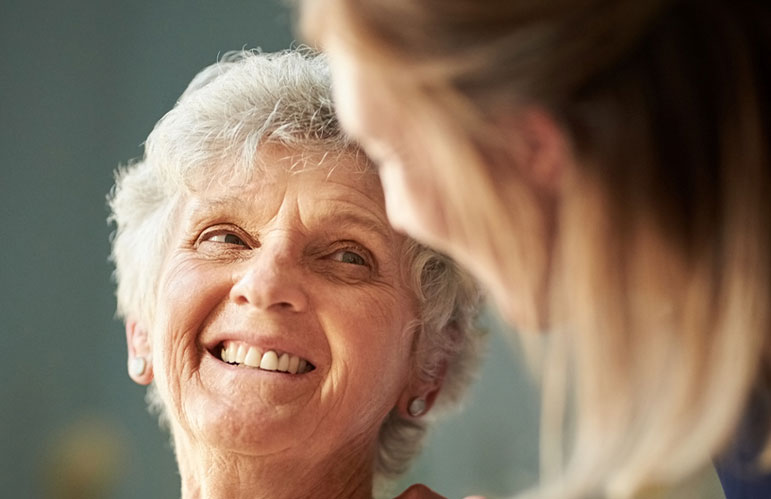Around one-third of over-65s who live at home will suffer a fall this year, and of those about half will do so more frequently. Most of these falls won’t result in a serious injury, but each fall carries the risk of broken bones and a loss of confidence.
If the worst should happen and an elderly loved one falls over, knowing what to do can help you manage the situation and take the necessary steps to prevent it from happening again. Remember, you’re not alone in helping to manage your relative’s risk of falling, which is an inevitable part of ageing.
There are organisations that can offer practical support and infrastructure to put in place to alert you in case your loved one falls in their own home. A fall alarm for the elderly can give both you and your relative the peace of mind needed to maintain independent living despite the possibility of a fall being a reality.
What to do immediately after a fall
Check your surroundings
In the event of fall, the first thing you should do is evaluate your surroundings. Although lots of elderly falls aren’t due to trip hazards, it’s important to look so you don’t get hurt by the same spilt drink or wayward cable that tripped your relative.
Tend to your loved one
Once you’re sure the area is clear, tend to your loved one and encourage them to remain calm. Elderly people can go into a state of shock after a fall, and this can cause further complications later on if it isn’t dealt with straight away.
Check for injuries
While reassuring your loved one, check them for bleeding, bruises or possible broken bones. If your relative has a serious injury, instruct them to stay still while you call the emergency services. Use a blanket to keep them warm while you wait and don’t be tempted to move them.
How to help an elderly loved one back on their feet
Proceed slowly
If your elderly relative isn’t badly hurt and wants to get up, explain that you will need to proceed slowly. Find a sturdy piece of furniture like a chair, place it near their head and help them roll over onto their side. Be mindful that if they get stuck, say they’re in pain or become too tired to carry on, you’ll need to stop and call for help.
Assist your loved one onto their hands and knees, being careful never to intervene too much. It’s important that your elderly relative is able to do most of the physical work. Your role is to guide them through the process and make sure they don’t lose their balance.
Use a chair
Place the chair directly in front of them so they can put their hands comfortably on the seat. Ask them to lean forwards and use the chair to support themselves as they bring their strongest leg forwards. Your relative can then use their arms and legs to lift themselves up.
Rest
Keep your loved one steady as they get up and pivot them onto the chair. Once they are seated, let them rest for a while and double-check that they aren’t in any pain. When you’re confident that they can stand without hurting themselves or falling over again, help them back onto their feet and notify their GP that they’ve suffered a fall.
Who to talk to after an elderly loved one falls over
One of the biggest issues surrounding elderly falls is reporting. Millions of older people fall every year, but the number who tell their doctor or family is shockingly low. This not only affects the elderly person in question but prevents healthcare providers, and bodies like the NHS, from knowing how common falls are and setting aside enough money to adequately support older people.
If an elderly loved one falls over, it’s vital that they tell their GP. Research shows that falling over once doubles an older person’s chances of falling again and neglecting to tell a doctor can delay the diagnosis of an underlying health condition.
Falls can cause elderly people some embarrassment, particularly if they feel a fall is indicative of a general decline in their health or independence. But however much your loved one doesn’t want to confront the issue, it’s important you talk about it openly.
Failing to discuss falls can increase your relative’s chances of falling over and suffering a serious injury. This is also a good opportunity to bring the topic of fall detection devices into the conversation.
Fall detectors
If you’re worried about an elderly relative falling over while you aren’t around, talk to them about wearing a fall alarm. These personal devices are designed to detect sudden changes in direction and speed, sending for help automatically if the user suffers a fall.
Another benefit of fall detection devices is preventing ‘long lies’. A long lie occurs when someone falls over and can’t get back up. By using a fall detector, no matter where the user is when they fall, they can call for help instantly and receive medical attention in double-quick time.
If you’re interested in joining a personal alarm service and want to learn more about fall detectors, take a look at our Care Hub Plus and Care Go packages. Both of these solutions from CareTech by SECOM offer fall detection and are very popular among older people.
